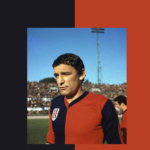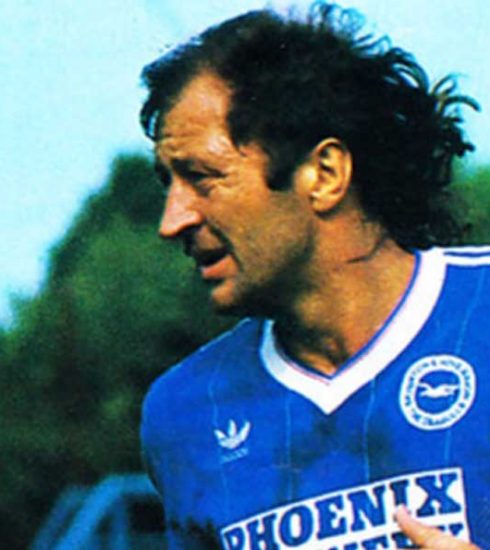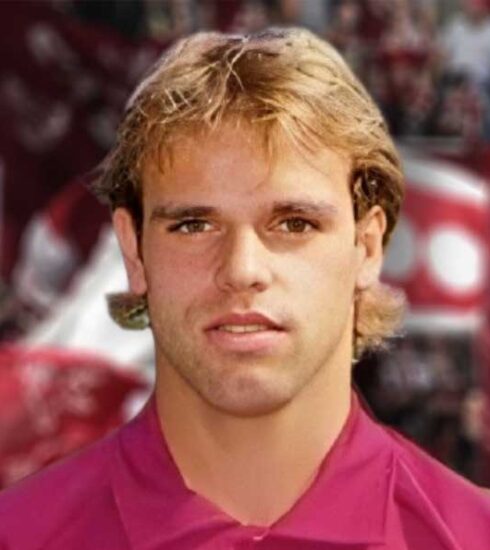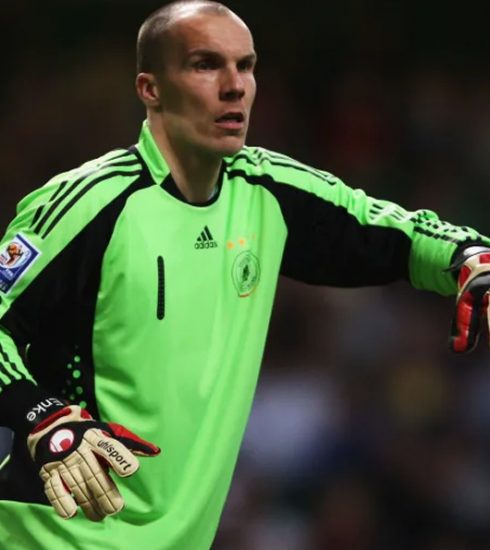GIGI RIVA: A story of courage, class and loyalty
‘



When he arrived here with us in the summer of 1963, he was not the muscular and powerful “marcantonio” that he is today.
He already had two incredible square shoulders, a strong-willed jaw and a smile that you never knew if it was shyness or if he was trying to take the piss.
But he was skinny as a rail and the first thing we Sardinians, who are the best in the world at cooking, thought was ‘what the hell do they feed those guys here on the continent?
He didn’t play as a pure striker at first.
They told us he was a winger (no laughing matter! That’s what they used to call those who had to divide their time between the defensive and offensive phases of the game), and in fact Giggi (strictly with two ‘gg’s’ here) was having a hard time chasing opponents and recovering balls in our half of the field.
But our coach Arturo Silvestri, known as ‘Sandokan’, who had been a defender all his life and knew a thing or two about strong forwards when he met them, put him in attack after a few games.
The least amazed were those like me who went to training sessions and were impressed by the power of this guy’s left foot and his incredible acrobatic skills.
Seeing him play as a striker, we immediately realised that this boy here could really go far.
And maybe take us, who have never seen the Serie A on the island, far too.
And in the meantime, ‘GIGGIRRIVVA’ we watched him grow and toughen up, but from the very first moment we understood that he had a skill that you don’t learn in training, no matter how good your coaches may be.
Courage. You have that in you. Or you don’t have it at all.
There was no ball he couldn’t reach, there was no opponent strong enough to get between him and that leather ball, and there was no law of gravity that conditioned his uplift to hit a header or to launch himself into reckless backhands in the heart of the opponent’s box.
There wasn’t a single Sunday when Giggi didn’t force us to hold our breath in fear when he dived head-first to hit a ball half a metre off the ground, amidst a forest of legs ready instead to kick that ball as far away as possible.
To cut a long story short … by the end of the season we were in the Serie A.
For the first time in history a team from the island would play in the national football championship.
This result shook everyone up.
I don’t know if it was by chance, but suddenly it seemed that the rest of Italy began to realise that Sardinia was not just made up of shepherds and fishermen and that we could end up in the news not only for kidnappings.
And if Ricciotti Greatti, a talkative Friulian who, after his time in Sicily with Palermo, had sworn that he would never play in an island football team again, was our leader and top scorer with 12 goals, the young RIva contributed in no small part with his eight goals to take us to the Olympus of Italian football.
… and the best was yet to come!
In the first Serie A season, we didn’t know what to expect.
But our boys were growing.
“Giggi” more than anyone else.
After a first half of the season in which we needed to get to grips with this new reality, in the second half we really became a tough nut to crack.
RIva scored nine goals that season, including one at Juventus in January 1965.
He had never done that!
From then on, and for almost 10 good years, not a week went by without a Juventus emissary coming to see him here at our glorious old Amsicora first, then at the S. Elia or on away trips to the continent.
But in the meantime our Giggi was getting stronger, gaining self-confidence and above all SMILING!
Something that the first year here we saw him do very few times.
There were many who came to us in those days convinced they were arriving in the anteroom of hell … but then when they realised that yes, we are stubborn and closed, but that if you know how to take us in the right direction, we also give you our heart … they found it hard to leave.
Instead, Riva was exactly how we Sardinians are.
Shy, stubborn and generous.
The following year we were saved with some anxiety but above all we lost our coach Silvestri, attracted by the flattery of ‘his’ Milan.
A Roman coach arrived, thin as a rail and apparently always serene and calm.
His name was Manlio Scopigno.
So different from Silvestri that in training he was capable of kicking the arse of players who did not do what he asked.
We finished sixth.
A great result.
Giggi scored 11 goals and it was then that they told us we couldn’t keep him with us any longer.
At least that’s how President Enrico Rocca thought.
“Riva is for sale”.
The reason was that the costs to continue playing in Serie A were too much for the club.
A revolution almost broke out.
‘GIGGIRRIVVA non si tocca’ was the phrase you could hear in every corner of Sardinia.
In the countryside, on boats, in schools and in bars.
Meanwhile Riva had become like a son, brother or nephew to half of Sardinia.
Every evening he was at dinner at a different family’s house!
We might say 40 words to each other in the whole evening, but the warmth we wanted to convey to him was felt.
Then came those who really had millions.
We became a joint-stock company.
And ‘Giggi’ stayed with us.
When Scopigno came back (who was dismissed for pissing in the open during a party, do you realise?) we didn’t need a football expert to understand that we were now a great team.
In 1968-69 we fought against Fiorentina to the very end for the title. ‘Giggi’ won the top scorers’ table with 20 goals.
Despite the fact that the year before he had fractured his fibula in a match with the national team.
We knew that we weren’t long before we could really think big.
Our ‘philosopher’ had now found the squaring of the circle.
Everyone in that summer of 1969 was sorry to see a great striker like Roberto Boninsegna go, but it only took a few games to understand that the quid pro quo Inter received was more than adequate.
In fact, it was an authentic bargain!
With Angelo Domenghini came that player not only capable of going back and forth dozens of times a game, but above all someone capable of putting in those crosses in the middle of the area on which our ‘GIGGIRRIVVA’ was practically impossible to contain.
Instead, with Sergio ‘Bobo’ Gori came the ideal partner for our number 11.
Able to move all over the attacking front, to give no points of reference to the opposing defenders and who, thanks to his remarkable selflessness and spirit of sacrifice, left Giggi free to think of one and only one target: to score goals.
The team was now complete, organised in every department and above all with that confidence in its own means that convinces you that nothing is impossible. We could even go into a disadvantage as against Roma or as in perhaps the most important match of all, the one against Juventus at the Comunale in Turin … but we knew that until the 90th minute it was never over for our boys.
And then there was Vicenza.
On a Sunday afternoon the whole of Sardinia came to a standstill.
Everyone with their ears to their radios.
In the bars, in the houses and on the seafront.
That day, Sandro Ciotti’s splendid biting voice told us of ‘an incredible goal, a sublime athletic gesture of rare beauty … such as has perhaps never been seen before on a football pitch’.
After such a description I remember that the wait to see this goal on Domenica Sportiva, Italian favourite football’s tv programme, was spasmodic.
Each of us tried to imagine what that goal would have been like … but no one, not even the most imaginative of Cagliari fans and our ‘GIGGIRRIVVA’ could have imagined a goal of such beauty and spectacularity.
R.A.I., The Italian television, had also managed to capture the action from below.
You can see Bobo Gori going to the back, he puts the ball in the middle of the area where “Domingo” heads the ball for Riva.
Giggi is heading towards goal but the ball is set back from his position.
It looks like a lost ball.
Not for Riva. For him the concept of “lost ball” simply does not exist.
Our bomber performs a complete twist with his body and then launches himself into a backhand to harpoon that ball into the sky with his magical left foot.
An instant later, the ball goes under the crossbar of Vicenza goalkeeper Pianta, Riva’s ex-partner at Cagliari until two seasons before, and literally annihilated by this feat.
Stuff not to believe your eyes.
Then came that wonderful 12th April 1970.
It was Gori and Riva who scored the two goals that gave us the Scudetto in the match at the S. Elia against Bari.
For Cagliari and the whole of Sardinia it was the realisation of a dream.
That has never been repeated and will probably never be repeated again … but as our Giggi often repeats, ‘winning a Scudetto here is like winning ten elsewhere’.
More than 50 years have passed since then.
Riva still lives here with us, on our island.
He has never left.
We gave him affection, warmth and protection.
… but with him, with GIGGIRRIVVA, we will always be in debt …
ANECDOTES AND CURIOSITIES
One of Riva’s passions was speed.
It was quite common to see him speeding with his car on the coast or on the winding roads of the hinterland. More than once it seems that the police turned a blind eye once they had checked who was behind the wheel. The best anecdote, however, concerns Roberto Boninsegna, his team-mate at Cagliari and in the national team, who once he got out of Riva’s car after a crazy race on the roads of Sardinia, decided on the spot to take out a life insurance policy!
Another of Riva’s great passions was cigarettes. The anecdote of when Gigi, hospitalised after the fracture of his fibula against Portugal, agreed to be interviewed by the great Gianni Mura in exchange for … a packet of cigarettes that the hospital had obviously forbidden him!
Also related to smoking (and not only!) is one of the funniest anecdotes about this great striker. It is Saturday evening and Cagliari are in training camp ahead of the championship match the next day. It is well past midnight but in Riva’s room there is no sleep.
There are goalkeeper Albertosi, centre forward Gori, defender Poli and obviously Riva.
A tight poker game is in progress. There is a bottle of whisky on the table and the room is enveloped in a single, gigantic cloud of smoke.
Suddenly a key is heard turning in the keyhole.
Gori is the quickest to realise what is about to happen and goes to hide in a cupboard.
The door opens and behind the ‘fog’ that envelops the room Riva and his associates catch sight of the silhouette of the Mister, Manlio Scopigno.
There is a long, embarrassed silence.
At a certain point Scopigno puts a hand in his jacket pocket, pulls out a cigarette and asks with all the tranquillity in the world, ‘Does it bother you if I smoke?
The laughter is general and liberating.
Obviously no sanctions and no reprimands.
On the contrary, as Riva himself would say, ‘From that day on, we would have gone to war for him if he had asked us’.
At a time when the salaries of footballers, even the best ones, were not even comparable to those of today, Riva’s refusal to leave his Sardinia to go and earn much more at one of the big teams in the north has always amazed everyone.
Juventus in particular assiduously courted the bomber from Leggiuno and for several years … without ever managing to take him away from his beloved Sardinia. Riva himself recounts that ‘practically every game played on the ‘continent’ at the end of the match I was approached by an emissary from Juventus, telling me that Boniperti was there and that he was waiting for me to meet and talk about my future. Eventually I learned to recognise them and as soon as I saw them I changed my route to avoid them!”
Money, as mentioned, was never fundamental for Riva.
There was an even bigger rejection with an even bigger sum at stake, the kind that can really change your life.
In fact, it happens that the director Franco Zeffirelli intends to offer Cagliari’s number 11 the part of Saint Francis of Assisi in his next film.
The offer is fabulous.
Gigi Riva simply says “No, thanks”, refusing the part and 400 million old lire.
The last anecdote is purely footballing and was told to me personally years ago by Giorgio Negrisolo, an excellent defender and midfielder for teams like Sampdoria, Roma and Verona with over 250 appearances in Serie A.
And it is as emblematic as ever to describe who Gigi Riva was.
‘It was 1970 and I was playing for Sampdoria in my second year in Serie A. That day we went to Cagliari, to play against a team launched to the top of the table while we were floundering in the lower zones. We were in the locker room and our coach, the great Fulvio Bernardini, told us, ‘Boys, today we’re playing against Gigi Riva. I don’t feel like imposing anything on you so I ask you: who feels like marking him?”
I see all my department mates simultaneously bow their heads, finding the tips of their shoes incredibly interesting.
The silence is absolute.
At that point I, a young 20-year-old virgula eager to show off, raise my arm and proudly say, ‘I’ll take care of it Mister!
That day I spent the most terrible 90 minutes of my football career.
We lost 4-0, and not only did Riva score a goal and set up a couple more, but I finished the match covered in bruises from head to toe!
… and to think that since I was the defender and he was the striker, I would be the one who would have to hit!
The same situation repeated itself a few years later, when I played for Roma.
This time the coach is the Swedish wizard Nils Liedholm but the question is the same.
“Guys who feels like marking Riva?”
… I, too, had joined the ‘shoe toe worshippers’ club!!!!





